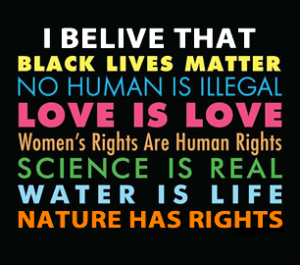The Abnormal is the New Anthropocene Climate Norm
“The danger signs are all around.” UN Secretary-General Ban Ki-Moon
While we really don’t need UN Secretary-General Ban Ki-Moon to tell us how f’d the planet and all of us are, it’s somewhat refreshing hearing a die-hard moderate like Ki-Moon speaking honestly about the coming crisis. Speaking from Doha last week at the annual UN climate talks.
Ki-Moon told members that time is running out, citing a growing number of recent reports that all show rising CO2 levels and other similar worrisome environmental indicators. “The abnormal is the new normal,” Ki-Moon told those at the UN meeting. “This year we have seen Manhattan and Beijing under water, hundreds of thousands of people washed from their homes in Colombia, Peru, the Philippines, Australia.”
Unfortunately the mainstream reporting on these climate negotiation events and the backroom political debates are sorely lacking in critical analysis, as coverage from The Star and others indicate. For example, in discussing the UN meeting earlier this week, as well as the side meetings taking place, the coverage continued to repeat some of the industry and right-wing talking points and political claims, something that no serious climate reporting should be able to continue to get away with. Now in fairness, this was actually an AP Wire story by Karl Ritter, not the Star’s in house reporting. Regardless of the source, reprinting it is the same as accepting the frame, so I have no problem taking them equally to task.
The strongest example of this shoddy reporting came in the following narrative discussing the science behind the meetings, and the continued debates over translating the science into political action or change:
Climate scientists say it’s difficult to link a single weather event to global warming but some say the damage caused by [Hurricane] Sandy was worse because of rising sea levels.A small minority of scientists still question whether the warming seen in recent decades is due to human activities, such as the carbon emissions from the burning of fossil fuels.
“Let us avoid all the skepticism. Let us prove wrong all these doubts on climate change,” Ban said.
First, there is no scientific debate over the fact that increased levels of CO2 directly cause an increase in global temperatures. This is an empirical fact that we have known and demonstrated scientifically for well over a century. It was first suggested in the early 1800’s by Joseph Fourier, further advanced a decade later by Claude Pouillet. The modern empirical basis was formally developed over the next half century by John Tyndall and Svante Arrhenius. It was Arrhenius (one of my favorite scientists, coincidentally) who is credited with first proposing the idea that the atmosphere operates much like a greenhouse for the planet. He published his ideas in an 1896 Philosophical Magazine and Journal of Science article (Arrhenius Greenhouse Paper) on carbonic acid in the atmosphere. Since then, no serious scientist has ever argued that more CO2 in the atmosphere does not lead to an overall warmer temperature. And we know from historical carbon records that the massive jump in Co2 levels over the past 150 years, but especially since the 1920’s, has no historic analog. If there are no historical analogs for such a jump over the past 4.5 billion years, and the burning of fossil fuels cannot be attributed to anything except human activity, it’s absolutely certain that anthropogenic climate change is happening and is caused by us.
 Yet the Star/AP Wire story, by suggesting that a “small minority of scientists” still have doubts, and thus somehow by implication there is not a global consensus–a point further affirmed by the quote from Ki-Moon saying “Let us prove wrong all these doubts on climate change,” an uninformed reader could almost think there is still a serious scientific debate over the reality of human-caused climate change. There is not!
Yet the Star/AP Wire story, by suggesting that a “small minority of scientists” still have doubts, and thus somehow by implication there is not a global consensus–a point further affirmed by the quote from Ki-Moon saying “Let us prove wrong all these doubts on climate change,” an uninformed reader could almost think there is still a serious scientific debate over the reality of human-caused climate change. There is not!
The best example of this ongoing media perpetuated public fallacy was discussed by Katherine Hayhoe and Andrew Farley in the chapter “No More Debate” from their 2009 book A Climate for Change. In discussing the widespread agreement amongst scientists they cite an article by Peter Doran and Maggie Zimmerman titled “Examining the Scientific Consensus on Climate Change,” EOS (2009, 90:3).
In other words, from 1993 to 2003 there was essentially no evidence in the peer-reviewed scientific research to support the myth that there is still a major disagreement amongst scientists regarding the reality and causes of recent climate change. Instead, an overwhelming consensus emerged–less than 0.01% of the research in climate science disagreed with the scientific consensus of the IPCC and other international scientific bodies.
So unless the media seriously wants to continue arguing that 0.01% of the scientific community constitutes a minority position worth taking seriously (and keep in mind this study was looking at data from almost a decade ago now (2003), so every single piece of evidence is stronger and more undeniable now), they need to stop discussing climate change in the framework of scientific doubt and skepticism. Likewise, global leaders like Ki-Moon need to do the same. There is no disagreement that climate change is happening except from those groups that directly benefit from its ongoing denial–the fossil fuel and chemical industries and their funded scientists, right-wing climate denial groups and some extreme religious fundamentalists who deny human agency can change God’s design–(i.e. human’s can’t cause climate change, only God can).
What’s the result of all this media and political nonsense?
“For all of the nations wrestling with the new reality of climate change – which includes the United States – this meeting failed to deliver the goods,” said Alden Meyer, of the Union of Concerned Scientists.
“At the end of the day, ministers were left with two unpalatable choices: accept an abysmally weak deal, or see the talks collapse in acrimony and despair — with no clear path forward,” Meyer said.
Until next time…remember, we are our own worst enemy when it comes to climate change.
###



